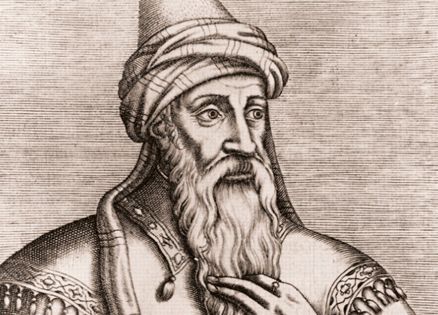If there is one thing that I have learned as a tenth-generation rabbi and longtime professor at Yeshiva University in New York City, it is that things are rarely what they seem, and that the hand of God is ever present in our lives. We Jews even have a word for it.
I’ve spent a lifetime studying and teaching the Talmud, the central text of Judaism and the basis of all Jewish law. It’s a sacred record of Jewish thought and debate dating back to the earliest rabbis. One that has inspired numerous commentaries over the centuries by some of the great Hebrew scholars, giants of our faith.
Generations of rabbis have looked to these sages for wisdom and inspiration. My personal hero is Moses Maimonides—a twelfth-century rabbi, physician and philosopher, whose guidance on everything from marriage to medical ethics is still followed by millions of Jews today.
But few have read his actual words, relying instead on texts based on original source material published long after his death that may contain critical errors—a point of considerable debate among Talmudic scholars.
For example, Jewish law states three requirements for marriage, any of which constitutes an effective union: for the groom to give the bride something of value, such as a ring, to sign a Ketubah, a Jewish wedding contract, and to consummate the marriage.
But according to the available texts, Maimonides claimed only the last two were effective biblically. For generations, scholars puzzled over this. Had the great Maimonides erred? Or had his words been misinterpreted? Was this perhaps a sign of a scribal error?
Perhaps the original document could help solve a centuries-old riddle.
However, Maimonides’ writings—tens of thousands of pages—are stored deep in the vast archives of the Vatican. The Vatican was reluctant to put such old, fragile documents on display. Oh, how I prayed to gaze upon those sacred texts myself!
In 2002 I was invited to present an award at an international medical ethics conference in New York City, to a doctor who had dropped everything to be of service at Ground Zero on September 11. The award was named for none other than Maimonides.
The teacher in me couldn’t resist telling the attendees about the special significance behind their recognition. I told them how Maimonides was one of the first scholars to strike a balance between science and religion, to see the spiritual dimension in medicine. How he wrote a Physician’s Oath similar to the Hippocratic Oath doctors recite today.
Afterward, a man rushed up to me. “That was fascinating,” he said. “I’m Jewish, but I’ve never heard of Maimonides.”
“Are you a doctor?” I asked him.
He laughed. “No,” he said. “My name’s Gary. I’m actually one of seven Jews ever knighted by the pope—an honor given to me after I was instrumental in the Vatican obtaining a charitable donation of very expensive medical equipment.”
“You know the pope?” I interjected. “The Vatican is where many of Maimonides’ writings are kept. I’d give anything to study those manuscripts.”
His smile widened. “I can’t promise anything, but I’ll make some inquiries. I was supposed to be somewhere else today, then at the last minute that fell through and a friend I hadn’t talked to in years invited me to this conference. Lucky coincidence, huh?”
Luck? Coincidence? I shook my head. “No,” I said. “It feels a lot more like bashert.”
“B-what?” he asked.
“It’s Yiddish,” I explained, “for seeing God’s hand at work in our lives.”
“Well, don’t count on any miracles yet, Rabbi,” Gary said.
I knew I shouldn’t get my hopes up. I had no idea how much pull he really had. Would the pope himself have to give his okay? Weeks went by. I stopped expecting to hear from Gary. But one day my office phone rang. Gary.
“Rabbi,” he said, “pack your bags. The pope, along with a group of cardinals and the head of the Vatican library, wants to meet with you.”
“What about the Maimonides?”
“Of course,” he said. “There’ll definitely be time for that.”
I hung up the phone in disbelief. I imagined holding the great scholar’s manuscripts in my hands, searching through the pages of dry, aged parchment. There was no time to waste. I had to prepare.
I sought advice from several prominent rabbis about what pages to study first. The answer never varied. “His writing on marriage.” “This is huge,” I heard over and over. “May God be with you.”
At last, the day arrived. After a meeting with the pope, Father Farina, head of the Vatican library, ushered me into a small climate-controlled room. “Only a select group of people have been in here,” he said.
My hands trembled with excitement. “Will I need gloves to handle the pages? How many hours will I have?” I asked. I wanted to breathe in the smell of the parchment, trace the lettering with my fingers, to immerse myself in Maimonides’ world.
“I’m sorry, Rabbi. There may have been a misunderstanding,” the Father replied. “These documents are very fragile; we can’t take them all out. We’ve pulled five random pages for you to look at. They’re under glass on the table in front of you. Please take a few minutes to enjoy them.”
I forced a smile, but inside I was crushed. I’d felt so sure God had led me here. A few minutes? Five measly pages? Out of tens of thousands?
I went to the first manuscript, my mind clouded with disappointment. It took a moment before I could focus on the faint Hebrew lettering. I read the first sentence, then the next. Then stopped.
Slowly, I reread them word by word. There was Maimonides’ treatise on marriage. He listed all three conditions. Each, he wrote, was biblically ordained. I’d solved the riddle. A historic discovery.
“Impossible,” I said. “How could you know?”
“What’s that?” the Father said. I told him the story. When I finished, the Father nodded. “Then you know the answer,” he said. “It’s bashert.”
A chance meeting at a medical ethics conference, a page of parchment selected randomly from thousands of possibilities. A miracle—one that led to the Vatican agreeing just a few years later to the first exhibition of Maimonides’ work in an Israeli museum.
No, the world isn’t always as it seems. A hand behind it guides us to answers we seek. I’m sure of it.
Download your FREE ebook, Mysterious Ways: 9 Inspiring Stories that Show Evidence of God's Love and God's Grace




